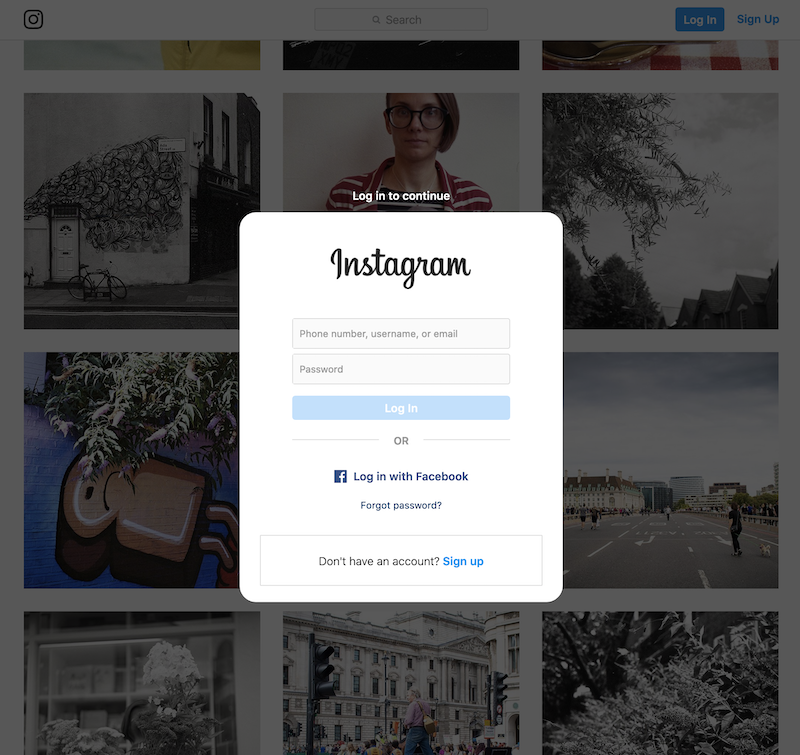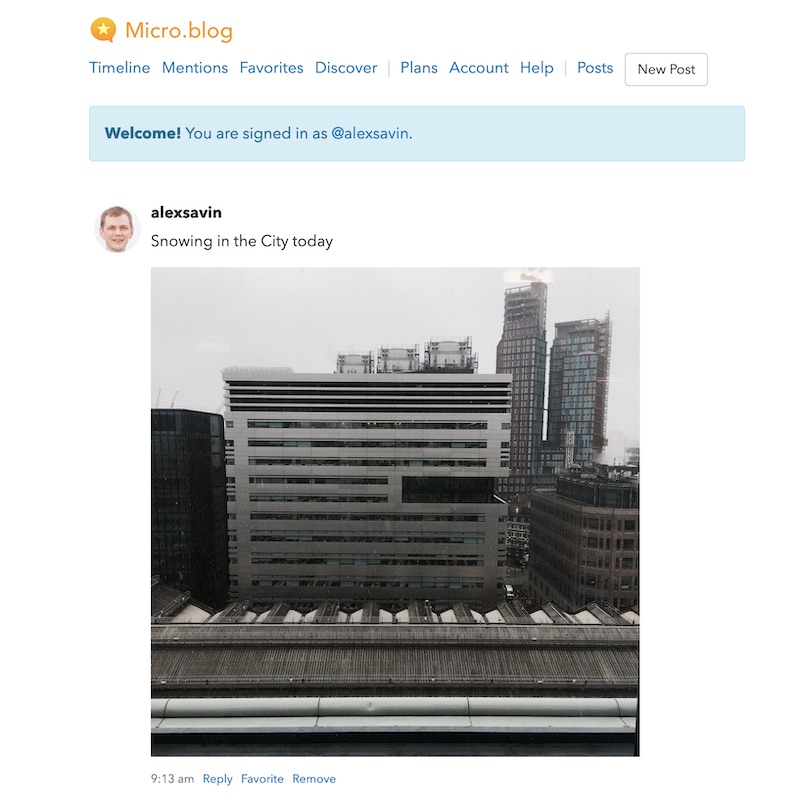Leaving Instagram for Open Web alternatives
"What, you're not using Instagram? Where do you post your photos then?"
This question came up a few times recently in conversations with my friends, so I thought I'd write a more detailed explanations.
I've been an active user of Instagram for a number of years. Daily logins, thousands of posts. Never became a proper IG celebrity, or even a micro-influencer - but I've had my fun following a significant amount of users posting pics from film cameras. It's been a long time since IG purists demanded IG is only appropriate for pictures taken on a phone camera. Doing that today would be your direct path to failure, since there are a billion users with the latest iPhone cameras, and every single one of them wants to become an influencer.
You have to be more inventive to win the game today.
Do you remember a time when all photos where forced to be a square? Oh, and a good selection of frames?

The answer to a question why you shouldn't use Instagram today have a few slices, so let me try and split this cake a little.
You are a product
I don't really like ads. I mean, it's totally justified for an online product to use ads as a revenue stream. Often, ads are the only viable revenue for an online service.
I used to like Instagram ads - they did nail the targeting thing and at some point it was recommending relevant events and things I actually was interested in. Lately however it feels that Facebook is grasping for increasing revenue. Facebook's core product is accessible via browser, hence ads can be blocked with extensions. I'm sure they are not happy about it. Instagram technically has a Web version, but it was deliberately strangled in order to push people towards the native app. This is where the majority of users are, and this is where FB has total control over the content.
This is where you can crank the revenue all the way to 11.
There are tricks for blocking ads in the native apps, but none of them will work with Instagram as I'm pretty sure that will block the rest of the content too. And, let's be completely honest, when you subscribe to services T&C:s, you also agree to watch the ads.
The only other fair alternative is that you stop using the service and leave.
API
Instagram used to have a nice API - a way for third parties like myself and yourself to build an alternative client with unique features to access pictures, leave comments, schedule posts and enjoy the experience on iPad - the core team been ignoring tablets forever. The bad news is - FB wants to strangle the third parties and stop them from existing.
The reason is easy enough - you don't have control over ads on those side apps, hence they don't contribute to the revenue. Why should you invest into features that don't contribute to your KPI:s? How are you going to get that quarterly bonus?
With the third party apps gone, the rest of the users will be forced to use the main client app, have all the latest features. And ads.
A sense of a timeline
Algorithimic timeline is great in some ways. Your best friends' pictures are always on top. The first picture is guaranteed to capture your attention and a like. One of the success metrics for the timeline team (I'm sure) is that top post must always get your like or comment. Because second post is an ad, and you'd want to scroll to see it after the success of a first post.
Algorithmic timeline is also a perfect tool for creating echo chambers. To guarantee your likes and satisfaction you will only be displayed posts from your previous likes and current desires, which means less relevant to your current mood posts will be pushed out of your timeline. People you follow become merely a number on your followers count.
In the current political climate of deliberate division I feel like algorithmic timeline might be a single most powerful feature that can bring extremely awful people to power.
I also like chronological timelines. I like how in Google Photos I can just scroll to a June 2017 and pretty quickly find what I'm looking for. Things will probably become more complicated once I'm old enough to loose track of time, but hopefully that'll take a few more years for my brain to soften on the social media apps.
Restricted access
One problem with closed platforms is how do you share your content with someone, who isn't there? There is instagram.com browser version of the app, which allowed anyone to view my stream of photos. React - the most popular JavaScript framework of all times - was literally invented as part of that project.
As of right now, you can still access my account online on https://www.instagram.com/alexsavinme/ . As soon as you arrive, you will be prompted to log in by a not insignificant banner at the bottom of the page. If you dismiss the banner and start scrolling through the pictures, you will be stopped by a proper overlay forcing you to either login or sign up. There is no way of dismissing that.

So much for the open access.
Alternatives
"This is all great" - you might say. "But there is literally no competition right now. Well, maybe TikTok."
Lately I've been following the Open Web movement, and they have a few options in a form of open source, decentralised, anyone can host this apps. Decentralisation and openness are probably two key things that matter the most to me.
Pixelfed
One of the direct competitors to Instagram is Pixelfed - https://pixelfed.org/ It is a web app which anyone can host. The clever twist here is that every instance can communicate with each other using a standard called ActivityPub. This way the network is decentralised, but you can still follow users from other networks, and everyone can like and comment on each other's photos.
You can post stories too.
At the moment of writing there are no native apps for Pixelfed, however their Web version works beautifully.
![]()
You can follow me here: https://pixelfed.social/alexsavin
If you decide to join Pixelfed, here are all the available instances: https://the-federation.info/pixelfed
Price: free (if you join one of the hosted instances)
Micro.blog
Not a direct competitor to Instagram, more like a slow Twitter sort of service, which also fallbacks nicely to Open Web standards. It is what is written on a tin - a service allowing you to post small blog posts. You can follow friends too.
Here's mine: https://alexsavin.micro.blog

It looks just like a homepage, and there is RSS feed to subscribe to, if you are not a user of Micro.blog but still would like to keep an eye on new posts.
Yes, RSS is alive and kicking, there are still amazing clients like Newsblur to subscribe to feeds and read latest updates. In fact, 95% of all podcasts are distributed via good old RSS. And there is an argument if you can call podcast a podcast if it is not available via RSS.
Microblog allows you to post pictures too. And they have something called emoji tags - it's when you use an appropriate emoji to signal the type of the content in the current post. This in turn enables discovery of photos (and books, and movie recommendations, and music) that users posted on the platform.
I mostly use Micro.blog as my Twitter replacement + open bookmarks registry. The community is nice too. You can fave posts, but also you get thoughtful comments and some of the greatest discussions with strangers on the Internet.
There is a native app for iOS and MacOS too.
Price: 5$ / month. This gives me hosted version of the service, so I don't have to host it myself. And, hopefully, helps the creator of the service to keep it up.
Flickr
It's still around - now saved by Smugmug, which tries to figure out what to do with it. I mainly use it as my main full res photo storage for all the film scans. There is no limit on how big a single photo can be - or it is incredibly high.
There are some unique communities still around on Flickr - one of highlights would be stereoscopic photo communities, and anaglyph in particular. If you have a pair of red/cyan glasses handy, you can discover tons of 3D photos on Flickr for your personal enjoyment.
My personal Flickr (been going since 2008): https://www.flickr.com/photos/karismafilms/
Cost: £4.50 / month
Openness
I should probably mention that every single above mentioned service allows public access to your public posts and photos for everyone with a link, with no need for registration or SMS. This is quite literally the fundamental principle of the Web how it was invented and intended to be used. It was also how the Internet was different from a bunch of other networks that existed long time before - everyone are invited, anyone can learn HTML and post your own webpage in no time. Also, you could view the source code of anyone's webpage, learn a trick or two, and use them on your own page.
These times are mostly gone now. Viewing page source on the Web is mostly reserved for software developers.